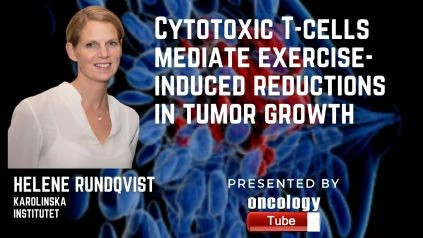Helene Rundqvist of the Karolinska Institutet speaks about Cytotoxic T-cells mediate exercise-induced reductions in tumor growth.
An abstract:
Exercise has a large spectrum of structural impacts. Repeated exertion decreases malignant tumor growth in animal models, and exercise can improve outcomes for cancer patients clinically. Like the cellular agents involved, the etiology of the impact of exercise on tumor development is unknown. We show here that exercise-induced reduction of tumor growth in mice is dependent on CD8+ T cells, and that metabolites produced in skeletal muscle and excreted in plasma in both mice and humans at high levels during exercise enhance the effector profile of CD8+ T cells. We observed that activated murine CD8+ T cells alter their central carbon metabolism in response to in vivo exercise and that when transferred to tumor-bearing untrained animals, immune cells from trained mice are more potent antitumor effector cells. These data show that through exercise, CD8+ T cells are metabolically altered in a way that increases their antitumor efficacy.
IN SUMMARY:
Nearly all tissues in the body are affected by exercise, and scientists have found that being physically active can minimize the risk of many forms of cancer and boost cancer patients’ outcomes. However, how exercise exerts its beneficial effects is still unclear. The tendency of cancer cells to evade immune system detection, which in some cases can prevent the body from destroying tumor cells, is one of the hallmarks of cancer.
Mice have been used by Rundqvist et al. to study how exercise helps the immune system function against the progression of tumors. They found that tumor growth was decreased when mice exercised, and this decrease in growth depended on the levels circulating in the blood of a particular type of immune cell, the CD8+ T cell. In addition, Rundqvist et al. found that through molecules that muscles released into the blood during exercise, CD8+ T cells were made more effective. After vigorous exercise, isolating immune cells revealed that these super-effective CD8+ T cells alter how they use molecules after exertion for energy production. First, immune cells from regularly exercised mice were transferred to non-exercised mice, where they were more successful than immune cells from untrained mice against tumor cells.

